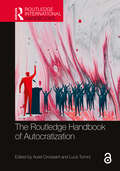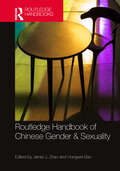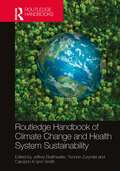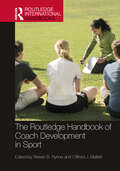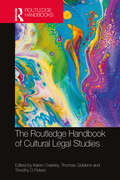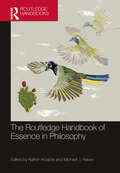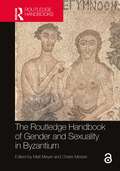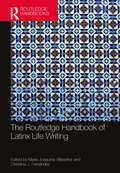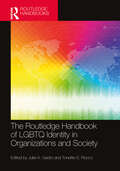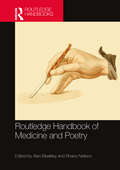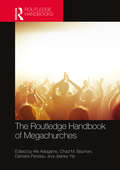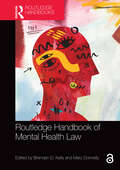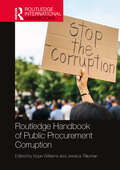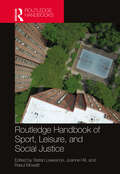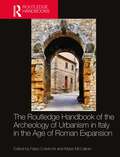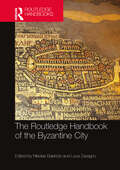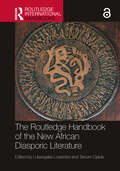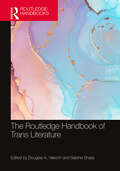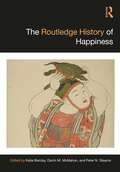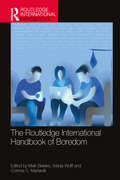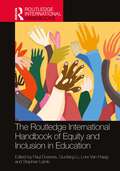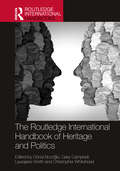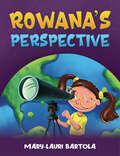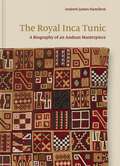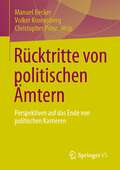- Table View
- List View
The Routledge Handbook of Autocratization (Routledge International Handbooks)
by Aurel Croissant and Luca TominiThe Routledge Handbook of Autocratization comprehensively and systematically explores the current understanding, and unchartered research paths, of autocratization.With wide-reaching regional coverage and expert analysis from Asia, North and South America, Europa, the Middle East, and North Africa, this handbook reveals cross-country, and cross-regional, analysis and insights and presents in-depth explanations and consequences of autocratization. Arranged in five thematic parts, chapters explore the basic aspects of conceptualization, theorization, and measurement of autocratization; the role of various political and non-political actors as perpetrators, supporters, bystanders, or defenders of democracy against autocratization processes; and the consequences across various policy fields. Showcasing cutting-edge research developments, the handbook illustrates the deeply complex nature of the field, examining important topics in need of renewed consideration at a time of growing concerns for democracy and the global spread of authoritarian challenges to democracy.The Routledge Handbook of Autocratization will be a key reference for those interested in, and studying authoritarianism, democratization, human rights, governance, democracy and more broadly comparative politics, and regional/area studies.Chapter 2 of this book is freely available as a downloadable Open Access PDF at http://www.taylorfrancis.com under a Creative Commons Attribution-Non Commercial-No Derivatives (CC-BY-NC-ND) 4.0 license.
Routledge Handbook of Chinese Gender & Sexuality
by Jamie J. Zhao and Hongwei BaoThis Handbook offers a rich survey of topics concerning historical, modern and contemporary Chinese genders and sexualities.Exploring gender and sexuality as key dimensions of China’s modernisation and globalisation, this Handbook effectively situates Chinese gender and sexuality in transnational and transcultural contexts. It also spotlights nonnormative practices and emancipatory potentials within mainstream, heterosexual-dominated and patriarchally structured settings. It serves as a definitive study, research and resource guide for emerging gender and sexuality issues in the Chinese-speaking world. This Handbook covers interdisciplinary methodologies, perspectives and topics, including: History Literature Art Fashion Migration Translation Sex and desire Film and television Digital media Star and fan cultures Fantasies and lives of women and LGBTQ+ groups Social movements Transnational feminist and queer politics Paying acute attention to nonnormative genders and sexualities and emphasising the intersectionality of gender, sexuality, nationality, ethnicity and class, this Handbook offers an essential, field-defining text to Chinese gender and sexuality studies.
Routledge Handbook of Climate Change and Health System Sustainability
by Jeffrey Braithwaite Yvonne Zurynski Carolynn K-lynn SmithThe Routledge Handbook on Climate Change and Health System Sustainability takes the reader on a journey to understand the interconnectedness of human health, climate change, and healthcare systems.The book begins by exploring how climate change is affecting human health through the increasing frequency of natural disasters, such as bush fires, droughts and heatwaves, and the emergence of new infectious diseases, such as the SARS-CoV2 virus, all of which drive up demand for health services that are already heavily burdened by increasing rates of chronic diseases and ageing populations. Chapters then turn to the contribution of the healthcare system itself to climate change— explaining how current clinical practices, including wasteful care of low value, create an unsustainable carbon footprint and threaten the very viability of healthcare systems. Throughout the volume, descriptions of practical solutions and implemented case studies are used to illustrate the feasibility of taking action in the real world of the healthcare delivery ecosystem.Bringing together a mix of forward-thinking environmental and health researchers, policymakers, leaders, managers, clinicians, patients, and health industry leaders to clarify the current state and future of sustainable healthcare systems, this book will be of interest to researchers and policymakers of climate and health systems.
The Routledge Handbook of Coach Development in Sport (Routledge International Handbooks)
by Steven B. Rynne Clifford J. MallettThe Routledge Handbook of Coach Development in Sport is a comprehensive text that underscores the importance of learning and context for those who sculpt the environment in which people of all ages develop in and through sport.Coaches and those responsible for the development of coaches are best positioned as both learners and facilitators of learning. As sport becomes more globalised, the concomitant professionalisation of coaches necessitates ongoing learning and development to embrace new knowledge and understanding. Moreover, contemporary coach development presents as a wicked problem, in that it continues to evolve, it is contextually bound, and there is no single or obvious way to approach it. Problematically, there is often limited assistance available to support coaches and coach developers in their ongoing development. As such, this book provides a truly international reference point that brings together leading scholars and practitioners from across the globe to provide an overview of the theories and practices of coaches and coach developers that are impacting the quality of sporting environments.Therefore, this book is an important reference for researchers, scholars, and practitioners alike in the fields of Sport Coaching, Coach Development, Sport Development, Sport for Development, Physical Education and related disciplines.
The Routledge Handbook of Cultural Legal Studies
by Karen Crawley Thomas Giddens Timothy D PetersThis handbook provides a comprehensive introduction to the cutting-edge field of cultural legal studies.Cultural legal studies is at the forefront of the legal discipline, questioning not only doctrine or social context, but how the concerns of legality are distributed and encountered through a range of material forms. Growing out of the interdisciplinary turn in critical legal studies and jurisprudence that took place in the latter quarter of the 20th century, cultural legal studies exists at the intersection of a range of traditional disciplinary areas: legal studies, cultural studies, literary studies, jurisprudence, media studies, critical theory, history, and philosophy. It is an area of study that is characterised by an expanded or open-ended conception of what ‘counts’ as a legal source, and that is concerned with questions of authority, legitimacy, and interpretation across a wide range of cultural artefacts. Including a mixture of established and new authors in the area, this handbook brings together a complex set of perspectives that are representative of the current field, but which also address its methods, assumptions, limitations, and possible futures.Establishing the significance of the cultural for understanding law, as well as its importance as a potential site for justice, community, and sociality in the world today, this handbook is a key reference point both for those working in the cultural legal context – in legal theory, law and literature, law and film/television, law and aesthetics, cultural studies, and the humanities generally – as well as others interested in the interactions between authority, culture, and meaning.
The Routledge Handbook of Essence in Philosophy (Routledge Handbooks in Philosophy)
by Kathrin Koslicki Michael J. RavenEssences have been assigned important but controversial explanatory roles in philosophical, scientific, and social theorizing. Is it possible for the same organism to be first a caterpillar and then a butterfly? Is it impossible for a human being to transform into an insect like Gregor Samsa does in Kafka’s The Metamorphosis? Is it impossible for Lot’s wife to survive being turned into a pillar of salt? Traditionally, essences (or natures) have been thought to help answer such central questions about existence, identity, persistence, and modality. These questions are not only of great philosophical interest, they also are of great interest to society at large.This Handbook surveys the state of the art on essence. Core issues about essence are discussed in 33 chapters, all of them written exclusively for this volume by leading experts. They are organized into the following four major parts, each with its own introduction that provides a summary and comparison of the part’s chapters: History Essence and Essentialisms: Themes and Variations Applications Anti-Essentialist Challenges. The volume is accessible enough for students while also providing enough details to make it a valuable reference for researchers.While the notion of essence has been targeted for sustained criticisms since antiquity, recent work has renewed interest in the topic. This Handbook explains and synthesizes much of this current interest, placing essence within its historical context and drawing connections to many contemporary areas of philosophy as well as to scholarly work in other disciplines. With cross-references in each chapter and a comprehensive index, The Routledge Handbook of Essence in Philosophy is a useful resource and essential reading for anyone, whether in or out of academic philosophy, seeking clarification on one of philosophy’s most distinctive and notorious notions.
The Routledge Handbook of Gender and Sexuality in Byzantium (Routledge History Handbooks)
by Mati Meyer Charis MessisThis Handbook is the first to consider the interrelated subjects of gender and sexuality in the Eastern Roman Empire from an interdisciplinary perspective. Drawing on both modern theories and Byzantine perceptions, and considering multiple periods and religions (Eastern Orthodox, Islamic, and Jewish), it provides evidentiary textual and visual material support for an analysis of the two linked themes.Broadly, the essays demonstrate that gender and sexual constructs in Byzantium were porous. As a result, they expand our knowledge of not only how sex and gender were conceived and performed but also how ideas and practices shaped Byzantine life.The Routledge Handbook of Gender and Sexuality in Byzantium will be an indispensable guide for students and scholars of late antique and Byzantine religion, history, culture, and art, who will find it a useful critical survey of current scholarship and one that shines new light in their areas of research. The focus on issues of gender and sexuality may also be of interest to individuals concerned with Eastern Mediterranean culture, as well as to the broader public.Chapter 21 of this book is freely available as a downloadable Open Access PDF at http://www.taylorfrancis.com under a Creative Commons Attribution-Non Commercial-No Derivatives (CC-BY-NC-ND) 4.0 license.
The Routledge Handbook of Latinx Life Writing (Routledge Literature Handbooks)
by Maria Joaquina VillaseñorThe Routledge Handbook of Latinx Life Writing provides an in‑depth introduction to Latinx life writing, taking a historical approach to the study of a variety of key Latinx life writers, genres, and thematic concerns. This volume includes chapters on fundamental genres of Latinx life writing including memoir, autobiography, oral history, testimonio, comics and graphic texts, poetry of protest, and theatre to more fully depict the breadth, dynamism, and vibrancy of Latinx life writing. Latinx people continuously engaged in the empowering act of telling their stories and narrating their lives, producing writing that at various times and in various ways expressed their joy, expressed their rage and anguish, and ultimately, asserted their subjectivity all the while indelibly contributing to the American literary landscape.
The Routledge Handbook of LGBTQ Identity in Organizations and Society (Routledge International Handbooks)
by Tonette S. Rocco Julie A. GedroSexuality, gender, gender identity, and gender expression are fluid constructs, and the ways in which identity development intersects with organizations and exists in society are complex. The book is comprised of a range of multi-disciplinary and globally inspired perspectives representing leading-edge scholarship by authors from over a dozen countries on a range of issues and contexts regarding LGBTQ identity and experience. It is intended for a wide readership: those who are in LGBTQ-related academic fields; those who want to broaden their coursework by offering supplemental readings that center the perspectives of LGBTQ identities; and those who want to acquire knowledge and education on the subject of LGBTQ identity. There are 36 chapters written by scholars in fields such as social work, law, queer studies, business, human resource management and development, entrepreneurship, criminal justice, economics, marketing, religion, architecture, sport, theater, psychology, human ecology, and adult education. The chapters can be read in sequence, and the book can also be used as a reference work for which educators, practitioners, and non-academics can identify and select particular chapters that inform areas of inquiry.
Routledge Handbook of Medicine and Poetry
by Alan Bleakley Shane NeilsonThe Routledge Handbook of Medicine and Poetry draws on an international selection of authors to ask what the cultures of poetry and medicine may gain from reciprocal critical engagement. The volume celebrates interdisciplinary inquiry, critique, and creative expansion with an emphasis upon amplifying provocative and marginalized voices.This carefully curated collection offers both historical context and future thinking from clinicians, poets, artists, humanities scholars, social scientists, and bio-scientists who collectively inquire into the nature of relationships between medicine and poetry. Importantly, these can be both productive and unproductive. How, for example, do poet-doctors reconcile the outwardly antithetical approaches of bio-scientific medicine and poetry in their daily work, where typically the former draws on technical language and associated thinking and the latter on metaphors? How does non-narrative lyrical poetry engage with narrative-based medicine? How do poets writing about medicine identify as patients? Central to the volume is the critical investigation of the consequences of varieties of medical pedagogy for clinical practice.Presenting a vision of how poetic thinking might form a medical ontology this thought-provoking book affords an essential resource for scholars and practitioners from across medicine, health and social care, medical education, the medical and health humanities, and literary studies.
The Routledge Handbook of Megachurches (Routledge Handbooks in Religion)
by Afe Adogame Chad M. Bauman Damaris Parsitau Jeaney YipThe Routledge Handbook of Megachurches provides a survey of global megachurch phenomena, with an international slate of authors introducing existing and emerging research on a wide variety of relevant topics.Over the past decade, the field of megachurch studies has matured and become global in its scope and orientation. The Handbook offers 33 chapters by top scholars in the field, focusing in particular on: The location, demographic nature, and transnational connections of megachurches. Megachurch worship, hermeneutics, and theology (in theory and practice). Megachurch institutional dynamics. The various ways that megachurches have both influenced and been influenced by their social contexts in terms of class, age, gender, sexuality, and pop culture. The Handbook's interdisciplinary orientation makes it essential reading for sociologists, political scientists, anthropologists, media specialists, pop culture observers, business strategists, leadership consultants, marketing analysts, scholars of religion, and Christian historians, theologians, and missiologists. Experienced scholars of megachurches will gain valuable insight into aspects of megachurch research beyond their own specializations. Scholars new to the field will find the chapters useful as signposts for where to begin their own academic exploration. Christian pastors and laypeople will learn more about this increasingly prominent and influential form of their faith.
Routledge Handbook of Mental Health Law (Routledge Handbooks in Law)
by Brendan D. Kelly and Mary DonnellyMental health law is a rapidly evolving area of practice and research, with growing global dimensions. This work reflects the increasing importance of this field, critically discussing key issues of controversy and debate, and providing up-to-date analysis of cutting-edge developments in Africa, Asia, Europe, the Americas, and Australia.This is a timely moment for this book to appear. The United Nations’ Convention on the Rights of Persons with Disabilities (2006) sought to transform the landscape in which mental health law is developed and implemented. This Convention, along with other developments, has, to varying degrees, informed sweeping legislative reforms in many countries around the world. These and other developments are discussed here. Contributors come from a wide range of countries and a variety of academic backgrounds including ethics, law, philosophy, psychiatry, and psychology. Some contributions are also informed by lived experience, whether in person or as family members. The result is a rich, polyphonic, and sometimes discordant account of what mental health law is and what it might be.The Handbook is aimed at mental health scholars and practitioners as well as students of law, human rights, disability studies, and psychiatry, and campaigners and law- and policy-makers.
Routledge Handbook of Public Procurement Corruption (Routledge International Handbooks)
by Sope Williams Jessica TillipmanThe Routledge Handbook of Public Procurement Corruption showcases the most innovative and exciting research being conducted in this important area of study, providing a comprehensive go-to reference for all who are interested in the topic.During the COVID-19 pandemic, the global race for health and ancillary goods amid global supply chain disruptions demonstrated that, when tested, all countries are incredibly vulnerable to fraud and corruption in public procurement, irrespective of their level of development. Yet despite the widespread nature of the problem, there remains a lack of in-depth, analytical, and cross-country investigations into public procurement corruption. This book addresses this gap by providing a comprehensive, multidisciplinary, geographically balanced treatise on corruption in public procurement. It combines country-specific studies to allow readers to easily compare differing perspectives and approaches and overarching thematic chapters to reflect on new and cutting-edge issues in procurement and their implications for procurement corruption. Key sectors such as healthcare and infrastructure are considered, as well as the role of new technologies, in both combatting and enabling procurement corruption.This Handbook provides academics, practitioners, and graduate researchers of public administration, law, and anti-corruption with all of the tools they need to understand the nuances of public procurement corruption around the world.
Routledge Handbook of Sport, Leisure, and Social Justice (Routledge Critical Perspectives on Equality and Social Justice in Sport and Leisure)
by Stefan Lawrence Joanne Hill Rasul MowattThis is the first book to explore in breadth and in depth the complex intersections between sport, leisure, and social justice.This book examines the relations of power that produce social inequalities and considers how sport and leisure spaces can perpetuate those relations, or act as sites of resistance, and makes a powerful call for an activist scholarship in sport and leisure studies. Presenting original theoretical and empirical work by leading international researchers and practitioners in sport and leisure, this book addresses the central social issues that lie at the heart of critical social science – including racism, sexism, homophobia, transphobia, ableism, religious persecution, socio-economic deprivation, and the climate crisis – and asks how these issues are expressed or mediated in the context of sport and leisure practices. Covering an incredibly diverse range of topics and cases – including sex testing in sport; sport for refugees; pedagogical practices in physical education; community sport development; events and human rights; and athlete activism – this book also surveys the history of sport and social justice research, as well as outlining theoretical and methodological foundations for this field of enquiry.The Routledge Handbook of Sport, Leisure and Social Justice is an indispensable resource for any advanced student, researcher, policymaker, practitioner, or activist with an interest in the sociology, culture, politics, history, development, governance, media and marketing, and business and management of sport and leisure.
The Routledge Handbook of the Archaeology of Urbanism in Italy in the Age of Roman Expansion
by Fabio Colivicchi Myles McCallumThe Routledge Handbook of the Archaeology of Urbanism in Italy in the Age of Roman Expansion explores trends in urbanism across Italy in the period when Rome extended its power across the entire peninsula, Sicily, Sardinia, and Corsica.Chapters present the most up-to-date archaeological data in the first broad and detailed treatment of this topic, superseding traditional academic particularism. They present a significant re-evaluation of the process of Roman imperialism and the role of urbanization within it. Particular attention is paid to evidence for local agency in different regions and at different sites, but general trends are also highlighted. Various types of urban sites are examined, including Indigenous urban centers that pre-date Rome’s conquest, colonies, both Greek and Roman, small centers in the hinterlands of larger urban entities, and the symbiotic relationship between urban centers and their rural territories. This volume challenges the existence of a standardized “Roman model” imposed on Rome’s vanquished enemies through conquest and highlights that this was a period of intense experimentation. Archaeological data are used to challenge traditional text-based historiographic models and reveal the complex interplay and tensions between Roman imperial control, local and regional traditions, and broader Mediterranean trends.This book is of importance to archaeologists and ancient historians working on urbanism and Roman Imperialism, as well as those interested in early urbanism in the Western Mediterranean and Europe and the comparative study of imperialism and colonialism across geographical areas and historical periods.
The Routledge Handbook of the Byzantine City: From Justinian to Mehmet II (ca. 500 - ca.1500) (Routledge History Handbooks)
by Nikolas Bakirtzis Luca ZavagnoThe Byzantine world contained many important cities throughout its empire. Although it was not ‘urban’ in the sense of the word today, its cities played a far more fundamental role than those of its European neighbors. This book, through a collection of twenty-four chapters, discusses aspects of, and different approaches to, Byzantine urbanism from the early to late Byzantine periods. It provides both a chronological and thematic perspective to the study of Byzantine cities, bringing together literary, documentary, and archival sources with archaeological results, material culture, art, and architecture, resulting in a rich synthesis of the variety of regional and sub-regional transformations of Byzantine urban landscapes. Organized into four sections, this book covers: Theory and Historiography, Geography and Economy, Architecture and the Built Environment, and Daily Life and Material Culture. It includes more specialized accounts that address the centripetal role of Constantinople and its broader influence across the empire. Such new perspectives help to challenge the historiographical balance between ‘margins and metropolis,’ and also to include geographical areas often regarded as peripheral, like the coastal urban centers of the Byzantine Mediterranean as well as cities on islands, such as Crete, Cyprus, and Sicily which have more recently yielded well-excavated and stratigraphically sound urban sites. The Routledge Handbook of the Byzantine City provides both an overview and detailed study of the Byzantine city to specialist scholars, students, and enthusiasts alike and, therefore, will appeal to all those interested in Byzantine urbanism and society, as well as those studying medieval society in general.
The Routledge Handbook of the New African Diasporic Literature (Routledge International Handbooks)
by Lokangaka Losambe Tanure OjaideThe Routledge Handbook of the New African Diasporic Literature introduces world literature readers to the transnational, multivocal writings of immigrant African authors. Covering works produced in Europe, North America, and elsewhere in the world, this book investigates three major aesthetic paradigms in African diasporic literature: the Sankofan wave (late 1960s–early 1990s); the Janusian wave (1990s–2020s); and the Offshoots of the New Arrivants (those born and growing up outside Africa).Written by well-established and emerging scholars of African and diasporic literatures from across the world, the chapters in the book cover the works of well-known and not-so-well-known Anglophone, Francophone, and Lusophone writers from different theoretical positionalities and critical approaches, pointing out the unique innovative artistic qualities of this major subgenre of African literature. The focus on the “diasporic consciousness” of the writers and their works sets this handbook apart from others that solely emphasize migration, which is more of a process than the community of settled African people involved in the dynamic acts of living reflected in diasporic writings.This book will appeal to researchers and students from across the fields of Literature, Diaspora Studies, African Studies, Migration Studies, and Postcolonial Studies.
The Routledge Handbook of Trans Literature (Routledge Literature Handbooks)
by Douglas A. Vakoch Sabine SharpThe Routledge Handbook of Trans Literature examines the intersection of transgender studies and literary studies, bringing together essays from global experts in the field. This volume provides a comprehensive overview of trans literature, highlighting the core topics, genres, and periods important for scholarship now and in the future.Covering the main approaches and key literary genres of the area, this volume includes: Examination of the core topics guiding contemporary trans literary theory and criticism, including the Anthropocene, archival speculation, activism, BDSM, Black studies, critical plant studies, culture, diaspora, disability, ethnocentrism, home, inclusion, monstrosity, nondualist philosophies, nonlinearity, paradox, pedagogy, performativity, poetics, religion, suspense, temporality, visibility, and water. Exploration of diverse literary genres, forms, and periods through a trans lens, such as archival fiction, artificial intelligence narratives, autobiography, climate fiction, comics, creative writing, diaspora fiction, drama, fan fiction, gothic fiction, historical fiction, manga, medieval literature, minor literature, modernist literature, mystery and detective fiction, nature writing, poetry, postcolonial literature, radical literature, realist fiction, Renaissance literature, Romantic literature, science fiction, travel writing, utopian literature, Victorian literature, and young adult literature. This comprehensive volume will be of great interest to scholars and students of literature, gender studies, trans studies, literary theory, and literary criticism.
The Routledge History of Happiness (Routledge Histories)
by Katie Barclay Darrin M. McMahon Peter N. StearnsUnmatched in originality, breadth, and scope, The Routledge History of Happiness features chapters that explore the history, anthropology, and psychology of happiness across the globe.Through a chronological approach that ranges from the Classical and Postclassical to the twenty-first century, this volume balances intellectual-history treatments and wider efforts to deal with relevant popular culture and experience, including consumerism. It explores how and why the history of happiness has emerged in recent decades, as well as psychological and social science approaches to happiness, with a history of how relevant psychological research has unfolded. Chapters examine early cultural traditions concerning happiness, including material on Buddhist and Chinese traditions, and how they continue to influence ideas about happiness in the present day. Overall, each section emphasises wide geographical coverage, with particular attention paid to East Asia, Latin America, Europe, Russia, and Africa.The Routledge History of Happiness is of great use to all undergraduates, postgraduates, and scholars interested in the global history of emotions.
The Routledge International Handbook of Boredom (Routledge International Handbooks)
by Maik Bieleke Wanja Wolff Corinna S. MartarelliThis comprehensive text is a unique handbook dedicated to research on boredom. The book brings together leading contributors from across three continents and numerous fields to provide an interdisciplinary exploration of boredom, its theoretical underpinnings, its experiential properties, and the applied contexts in which it occurs.Boredom is often viewed as a mental state with little utility, though recent research suggests that it can be a powerful motivator of human behavior that shapes our actions in many ways. The book examines boredom from a range of perspectives and is comprised of three parts. Part I delves into the theoretical approaches to boredom, presenting methods for its measurement, explaining when and why boredom occurs, and scrutinizing the impact it has on our behavior. Part II focuses on the psychological and neural properties of boredom and its associations with a multitude of mental and interpersonal processes, such as self-control, mind-wandering, flow, and aggression. Part III presents boredom in practical contexts like school and work, and sheds light on its role for health-related behaviors, psychosocial well-being, and aesthetic experiences. The book concludes by summarizing the state of boredom research, identifying promising areas for future research, and providing directions for how research on boredom can be advanced. As the authoritative book on boredom, this handbook is an essential resource for students and researchers of psychology, sociology, education, sport science, and computer science.
The Routledge International Handbook of Equity and Inclusion in Education (Routledge International Handbooks of Education)
by Paul Downes Guofang Li Lore Van Praag Stephen LambProviding a cornerstone to the global debate on equity and inclusion within education, this handbook explores equity issues pertaining to poverty and social class, race, ethnicity, sociocultural, sociolinguistic exclusion in education and recognises intersectionality and gender across these dimensions.This carefully curated collection of essays written by international experts promotes inclusive systems in education that explicitly recognise the voices of learners who may be at risk of marginalisation, exclusion or underachievement. Developing a multilayered innovative conceptual framework involving spatial, emotional-relational and dialogical 'turns' for education, it emphasises key system points for reform, including building strategic bridges between health and education for vulnerable groups and shifts in focus for initial teacher education and the wider curriculum.The handbook is organised into the following key parts: Theoretical Frameworks Funding Models and Structures for Equity and Inclusive Systems Exclusion and Discrimination Bridging Health and Education Agency and Empowerment Outreach and Engagement The Routledge International Handbook of Equity and Inclusion in Education will be of great value to academics operating in the areas of education, psychology, sociology, social policy, ethnography, cultural studies; researchers in university research centres and in policy institutes pertaining to education, poverty, social inclusion as well as international organisations involved with inclusion in education.
The Routledge International Handbook of Heritage and Politics (Routledge Handbooks on Museums, Galleries and Heritage)
by Gönül Bozoğlu Gary Campbell Laurajane Smith Christopher WhiteheadThe Routledge International Handbook of Heritage and Politics surveys the intersection of heritage and politics today and helps elucidate the political implications of heritage practices. It explicitly addresses the political and analyses tensions and struggles over the distribution of power. Including contributions from early-career scholars and more established researchers, the Handbook provides global and interdisciplinary perspectives on the political nature, significance and consequence of heritage and the various practices of management and interpretation. Taking a broad view of heritage, which includes not just tangible and intangible phenomena, but the ways in which people and societies live with, embody, experience, value and use the past, the volume provides a critical survey of political tensions over heritage in diverse social and cultural contexts. Chapters within the book consider topics such as: neoliberal dynamics; terror and mobilisations of fear and hatred; old and new nationalisms; public policy; recognition; denials; migration and refugeeism; crises; colonial and decolonial practice; communities; self- and personhood; as well as international relations, geopolitics, soft power and cooperation to address global problems.The Routledge International Handbook of Heritage and Politics makes an intervention into the theoretical debate about the nature and role of heritage as a political resource. It is essential reading for academics and students working in heritage studies, museum studies, politics, memory studies, public history, geography, urban studies and tourism.
Rowana's Perspective
by Mary-Lauri BartolaRowana is a smart, curious little girl, who believes she can achieve whatever she sets her mind on. She breathes positivity and sees the world not only as a place from which she can learn but also take to many new levels. She is today’s role model for young minds who will one day be changing the world.
The Royal Inca Tunic: A Biography of an Andean Masterpiece
by Andrew James HamiltonThe hidden life of the greatest surviving work of Inca artThe most celebrated Andean artwork in the world is a five-hundred-year-old Inca tunic made famous through theories about the meanings of its intricate designs, including attempts to read them as a long-lost writing system. But very little is really known about it. The Royal Inca Tunic reconstructs the history of this enigmatic object, presenting significant new findings about its manufacture and symbolism in Inca visual culture.Andrew James Hamilton draws on meticulous physical examinations of the garment conducted over a decade, wide-ranging studies of colonial Peruvian manuscripts, and groundbreaking research into the tunic&’s provenance. He methodically builds a case for the textile having been woven by two women who belonged to the very highest echelon of Inca artists for the last emperor of the Inca Empire on the eve of the Spanish invasion in 1532. Hamilton reveals for the first time that this imperial vestment remains unfinished and has suffered massive dye fading that transforms its appearance today, and he proposes a bold new conception of what this radiant masterpiece originally looked like.Featuring stunning photography of the tunic and Hamilton&’s own beautiful illustrations, The Royal Inca Tunic demonstrates why this object holds an important place in the canon of art history as a deft creation by Indigenous women artists, a reminder of the horrors of colonialism, and an emblem of contemporary Andean identity.
Rücktritte von politischen Ämtern: Perspektiven auf das Ende von politischen Karrieren
by Manuel Becker Volker Kronenberg Christopher PrinzPolitikwissenschaftliche und zeitgeschichtliche Untersuchungen zu den Karrieren deutscher Spitzenpolitiker*innen beschäftigten sich bislang vor allem mit deren Aufstieg und weniger mit dem Ende von politischen Laufbahnen. Aus welchen Gründen treten Politiker*innen aus dem Amt zurück? Was sind die Hintergründe, Motive und Konsequenzen einer solchen Entscheidung? Müssen Rücktritte zwingend Resultat eines Scheiterns sein oder kann es auch „erfolgreiche“ Rücktritte geben? In diesem Band werden theoretische Grundlagen der Rücktrittsforschung aus rechtlicher und politikwissenschaftlicher Perspektive erarbeitet, Rücktrittskulturen in unterschiedlichen Ländern vergleichend untersucht sowie verschiedene Fallbeispiele in ihren spezifischen Einzelfallbedingungen unter die Lupe genommen.
